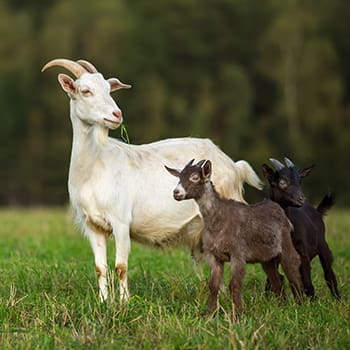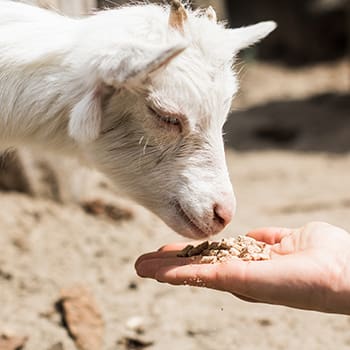Goats are wonderful animals to raise because of their unique and fascinating characteristics. They are extremely versatile and make great additions to any homestead. There are several reasons why goats are an excellent choice of livestock. In this article, you’ll find out everything you need to know about raising goats.
The Benefits Of Raising Goats
If you have the space, all homesteaders should raise goats, here are some of the most common reasons why.
Sustainable Agriculture: Goats can play an important role in sustainable agricultural practices in the following ways:
- Land Management:
 Goats can help manage vegetation on pasturelands because they’re natural grazers. By eating dry bush and other excess produce on the land, goats reduce the risk of wildfires.
Goats can help manage vegetation on pasturelands because they’re natural grazers. By eating dry bush and other excess produce on the land, goats reduce the risk of wildfires. - Sustainable Grazing: Rotational grazing is when pasture is divided into small sections and the goats are rotated through each section. This gives the vegetation time to recover and regrow before the goats come back which promotes healthier pastures and reduces the risk of overgrazing.
- Natural Fertilizer: Goat manure makes an excellent natural fertilizer for crops. Using goat manure as a fertilizer eliminates the need for synthetic fertilizers which are known to have negative effects on the environment.
Related: Goats Or Sheep?
Meat: Goat meat is low in fat, lean, and a healthy source of protein. Whether you choose to sell goat meat or cook it for your family, goats will always provide you with delicious meat.
Milk and Dairy Products: Goat milk is highly nutritious containing essential vitamins and minerals including calcium, magnesium, vitamin A, and vitamin D. Goat milk can be used to make dairy products such as ice cream, yogurt, cheese, and butter.
Companionship: While it’s true that goats are great additions to a homestead because they provide things such as meat, and dairy products, they also make great companions. Here’s why:
- Social and Affectionate: Goats love interacting with humans, they seek out attention from their owners and enjoy being petted.
- Entertaining and Playful: With their playful and friendly nature, goats are a joy to watch and are known to give their owners endless hours of entertainment.
- Calming Influence: Goats have a gentle nature, and they make soft soothing sounds that provide a sense of tranquillity and peace.
How To Feed Goats
Like all animals, goats need a balanced and nutritious diet to be healthy and productive. Goats are ruminants, meaning they have a four-chambered stomach designed for digesting plant-based foods. They are natural browsers, preferring to graze on a variety of vegetation such as weeds, shrubs, and leaves. Here is a list of some of the foods that are good for your goats, and the foods that are not.
Foods To Feed Your Goats
Hay: Hay is the most important part of a goats diet for several reasons, here are some of the most common:
- Provides Fiber: Goats need fiber to help maintain their digestive system. It prevents bloating and gas. A fiber deficiency can cause digestive problems that can lead to serious health complications.
- Provides Protein: Hay such as alfalfa is high in protein which is important for reproduction, growth, and milk production in goats.
- Regulates Weight: Hay provides a consistent source of nutrition that helps regulate their weight. Goats that graze on vegetation alone don’t get enough nutrition, leading to weight loss and other health problems.
Grains: Grains are a good source of protein and energy for goats. They can eat grains such as wheat, oats, barley, and corn. Nevertheless, feeding goats too much grain can cause digestive issues.
Forage: Foraging for goats includes things such as tree bark, shrubs, leaves, and grass. Foraging provides goats with a natural diet that’s high in fiber and nutrients.
Vegetables: Goats can eat vegetables such as cabbage, lettuce, beets, and carrots for additional sources of vitamins and minerals. However, do not overfeed them because too much can cause diarrhea.
Fruits: Fruits are a rich source of vitamins and minerals, they also give goats plenty of energy. They can eat fruits such as watermelon, bananas, pears, and apples. Again, feed goats fruit in moderation to prevent diarrhea.
Foods Not To Feed Your Goats
Although goats are known to eat a wide range of foods. Certain foods will cause digestive and other health problems. Here are some of them:
Potatoes: Potatoes and the peel contain solanine which can irritate the digestive tract and cause gastrointestinal distress including abdominal pain, vomiting, and diarrhea. Large amounts of solanine can be incredibly toxic and trigger neurological symptoms such as paralysis, seizures, and tremors.
Tomato Leaves and Stems: The stems and leaves from the tomato plant also contain solanine which as you’ve read, can cause several health problems for goats.
Rhubarb: The stalks and leaves of rhubarb contain oxalic acid. Oxalic acid can bind to calcium and form calcium oxalate crystals in the body which blocks the absorption of calcium and cause a nutritional deficiency.
Chocolate: Chocolate contains theobromine and caffeine. These compounds are toxic to goats because they can’t metabolize them as well as humans. The substances accumulate in the goat’s system which can poison them.
Avocado: The fruit, leaves, and bark of the avocado plant contain a toxin called persin which can be harmful to goats.
How To Protect Your Goats From Predators
To preserve the life of your goats, you must protect them from predators, here are some tips:
- Guardian Animals: Consider keeping livestock guardian animals such as Maremma Sheepdog, Anatolian Shepherd, or a Great Pyrenees. These breeds are trained to protect livestock from predators. You can also use llamas or donkeys which are good at deterring predators such as dogs and coyotes.
- Fencing: Use quality fencing such as electric, or woven wire, and make sure the fence is 4-5 feet tall to prevent predators from jumping over it.
- Secure Shelter: Make sure predators can’t get into the goat’s enclosure by making sure it’s fitted with sturdy locked doors, and the windows are covered with predator-proof mesh.
- Lighting: Predators stay away from well-lit areas. You can deter them by installing motion-activated lights around the goat enclosure.
Final Thoughts
As you’ve read, there are many benefits to raising goats; however, to maximize these benefits, make sure that your goats are healthy, by regularly monitoring them for signs of illness. Additionally, keep refining your management practices because the better you manage your goats, the more beneficial they’ll be for your homestead.
You may also like:
7 Domestic Animals That Are Too Easy To Raise
The Succulent Red Plant That Tastes Like Bacon (Video)
Livestock Animals You Should Start Raising For The Upcoming Economic Crisis
How to Use the Whole Animal (Whether You Raise Your Own or Buy It)










